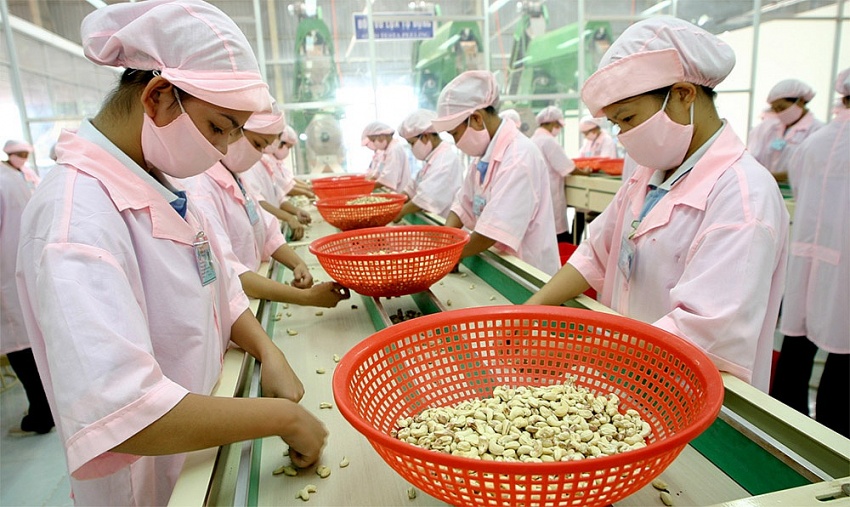Vietnamese agri-exports to UK continue forward motion
 |
| Vietnam is boosting exports, especially agro-forestry-fishery products, to the British market |
According to fresh figures from the General Department of Vietnam Customs, Vietnamese agricultural product exports to the United Kingdom have kept rising since the UK-Vietnam Free Trade Agreement (UKVFTA) took effect in May 2021.
Last year, Vietnam’s total goods export turnover from the UK reached $6.34 billion, up 4.6 per cent on-year. In January, the figure sat at nearly $780.5 million, up more than 57 per cent on-year, in which Vietnam earned a trade surplus of nearly $731 million.
Almost all items saw an export value growth, especially agro-forestry-fishery products, such as coffee (218.5 per cent), cashew (61 per cent), pepper (over 60 per cent), fruit and vegetables (56 per cent), and aquatic products (26 per cent).
Last year, Vietnam’s total agro-forestry-fishery export turnover from the UK last year exceeded $770 million, accounting for 12 per cent of its total export turnover from the European nation. Many types of products also enjoyed a big rise in export value in the British market, such as fruit and vegetables (17 per cent, with total value of $24.3 million); cashew (13 per cent, nearly $98 million); and coffee (11 per cent, $101.1 million).
According to the Vietnamese Trade Office to the UK, such impressive export turnover increases are ascribed to the UKVFTA. Under the deal’s commitment, 94 per cent out of almost 550 tariff lines of vegetable and fruits and related by-products have been removed since the deal’s entry into force.
Items with immediate exemption of non-quota import tariffs to the UK market include coffee, rambutan, mango, litchi, longan, dragon fruit, coconut, and pickle. Other items including shrimp, tuna, ground fish, fragrant rice, cassava starch, and other agricultural products will also be exempted from tariffs under quotas.
“In 2024, after the UK joins the Comprehensive and Progressive Agreement for Trans-Pacific Partnership, some Vietnamese products with big potential such as fragrant rice, surimi, tuna, and honey will be able to increase their market share in the UK thanks to more tax-free quotas,” Nguyen Canh Cuong, former trade counsellor of Vietnam in the UK, told VIR.
With the UKVFTA, the UK also provides Vietnam with a quota of supplementary tariffs, with the latter allowed to import free-of-charge a number of supplementary goods volumes into the former for 14 types of goods, including rice and 36 Vietnamese geographical indications to be protected in the UK, such as Ban Me Thuot coffee and Phu Quoc fish sauce.
According to Cuong, during the last decade, British distributors have paid more attention to products made in Vietnam and to Vietnamese suppliers. This is because of good product quality, committed business performance and significant improved infrastructure in Vietnam.
“Many types of products from Vietnam such as seafood, pepper, cashew, coffee, rice, textiles and garments, and footwear products are now available almost in every distribution channel in the UK,” Cuong said, adding the UK is a huge market with an annual average import turnover of $700 billion from many sources worldwide.
However, according to the Vietnamese Trade Office to the UK, in order to boost agro-forestry-fishery exports to the market, exporters from Vietnam need to pay special attention to changes and regulations in the UK where there is an uptrend in consuming organic and environmental-friendly products.
For example, the UK is introducing its Border Target Operating Model in several stages in 2024. This means additional customs rules and checks when exporting goods to the UK. Depending on the types of products businesses export, this may mean more paperwork and/or physical checks at the border.
| British food and beverage products in Vietnam under the UKVFTA * Tariffs: Most F&B products tariffs will be gradually eliminated over 2-9 years. Some products may use a tariff quota, which brings tariff rates to zero for approved exporters as part of a pre-determined quota. Tariff schedules: - Meat: tariff rates eliminated on beef after two years, while chicken will be fully liberalised after nine years. - Dairy products will be duty free after four years. - Chocolate will be duty free after 4-6 years. - Frozen pork, food preparations, wine, spirits, and pasta will be duty free after six years. - For fisheries, salmon, halibut, trout and rock lobster are immediately duty-free, with others are after two years. - Wine and spirits will be duty free after six years. * Market access: Under the sanitary and phytosanitary measures chapter, there are commitments relating to mutual recognition, list of approved exporters, commitment to international standards, and simplification of import procedures. The following UK geographical indications are protected: - Irish whiskey - Irish cream - Scotch whisky - Scottish salmon The food and beverage products that Vietnam imports most from the UK are beverages, fish, products of the milling industry, preparations of cereals, flour, starch or milk and dairy produce. Vietnam’s most favoured nation rates on such products are between 3-60 per cent. Source: The UK Department for International Trade |
 | UK-Vietnam trade pact already demonstrating value The United Kingdom-Vietnam trade relationship is poised to reach new heights, buoyed by the celebration of 50 years of UK-Vietnam bilateral relations last year, guided by the continued implementation of the UK-Vietnam Free Trade Agreement (UKVFTA), and further boosted by the UK joining the Comprehensive and Progressive Trans-Pacific Partnership (CPTPP). |
What the stars mean:
★ Poor ★ ★ Promising ★★★ Good ★★★★ Very good ★★★★★ Exceptional
Related Contents
Latest News
More News
- Hermes joins Long Thanh cargo terminal development (February 04, 2026 | 15:59)
- SCG enhances production and distribution in Vietnam (February 04, 2026 | 08:00)
- UNIVACCO strengthens Asia expansion with Vietnam facility (February 03, 2026 | 08:00)
- Cai Mep Ha Port project wins approval with $1.95bn investment (February 02, 2026 | 16:17)
- Repositioning Vietnam in Asia’s manufacturing race (February 02, 2026 | 16:00)
- Manufacturing growth remains solid in early 2026 (February 02, 2026 | 15:28)
- Navigating venture capital trends across the continent (February 02, 2026 | 14:00)
- Motivations to achieve high growth (February 02, 2026 | 11:00)
- Capacity and regulations among British areas of expertise in IFCs (February 02, 2026 | 09:09)
- Transition underway in German investment across Vietnam (February 02, 2026 | 08:00)

 Tag:
Tag:



















 Mobile Version
Mobile Version